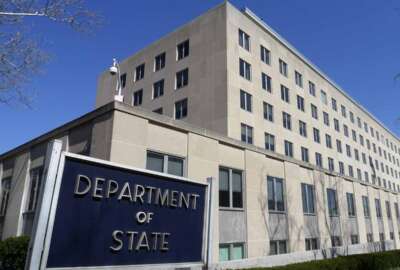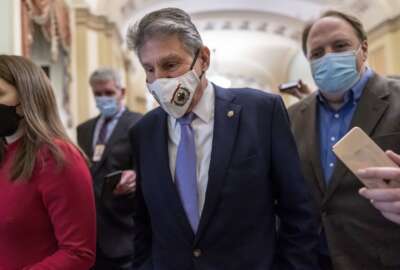Services contractors gear up for a battle with the Biden administration
An executive order from the Biden administration is ostensibly aimed at protecting employees of services contractors. With one view of it, the executive vice...
Best listening experience is on Chrome, Firefox or Safari. Subscribe to Federal Drive’s daily audio interviews on Apple Podcasts or PodcastOne.
An executive order from the Biden administration is ostensibly aimed at protecting employees of services contractors. It would require a company that wins a follow-on contract from an incumbent to give the incumbent employees first right of refusal to work for the winning company. It’s an idea that’s come up in earlier Democratic administrations. With one view of it, the executive vice president for policy at the Professional Services Council, Stephanie Kostro, joined Federal Drive with Tom Temin.
Interview transcript:
Tom Temin: Stephanie, I’m guessing the council is not thrilled with this rule.
Stephanie Kostro: Thanks for bringing this up, Tom. This executive order, which is for those geeks who follow it at home like me, executive order 14055 talks about non-displacement of qualified workers under service contracts. The question that we have is why this is coming up yet again, this last came up some 10, 11 years ago under President Obama. There was a proposed rulemaking under that this time around the executive order, actually includes the clause language for the Federal Acquisition Regulation. And we have lots and lots of questions about what it contains.
Tom Temin: Well, first of all, the idea that if you bid against another company, then have to hire that company’s employees if it loses seems a little ridiculous on the face of it simply because you have bid with your people and won with your people and your talent. It just seems like a strange proach because I wonder if it’s even legal.
Stephanie Kostro: So that’s a great point Tom. It really in its essence, I understand the administration wants to protect workers, I get that. We too, at the Professional Services Council rely so heavily on our member companies and their workforce to perform, not only when but perform on contracts. This executive order unnecessarily denies government contractors the right to select their own workforce, while they’re still being held accountable for the work they perform under contract. So the questions that we have are manifold on this executive order. I’m hoping that the process plays out through a comment process on the FAR clause. As I mentioned, the Federal Acquisition Regulation clause that’s included in EO. Again, we’re all about the workforce, I just wonder how companies can bid on contracts without actually having the workforce in house. It’s sort of a fuzzy area.
Tom Temin: And what if the new company won because the government didn’t like the employees of the incumbent? Maybe that’s why they lost.
Stephanie Kostro: Well one wrinkle in this executive order, wrinkle may be the wrong word for it. One complicating factor in this executive order is that it has to be workers who perform well on the incumbent contract have a right of first refusal to go to the new company that wins the contract. I don’t know how you define how a worker is working well under a contract, that seems to be a huge gray area where you’re really relying on the incumbent company to rate their employees. Are they working well? Did they perform well under that contract? And how do you translate that to a new company with its own culture, with its own rules, with its own pluses and minuses? And so you’re exactly right. What if the incumbent company did not win because of their workforce, and how do you translate that into the new contract? So, again, a complicating factor.
Tom Temin: We’re speaking with Stephanie Castro, Executive Vice President for policy at the Professional Services Council. So what will the council and are you working with other organizations, other contractor groups, to try to argue this case, argue against the executive order?
Stephanie Kostro: This is exactly what we’re doing. We are expressing strong concerns about not only the the purpose behind the executive order, but really the devil is always in the details. And so we are working up comments on the executive order, we will be sharing them with the administration. Again, I hope the process plays out in terms of asking for comments through a typical rulemaking process. And we will obviously be submitting comments there too. You raise a great point, we are not alone in the Professional Services Council, in having concerns and we will be looking for other associations and organizations to partner with in order to make our case about why the details matter here and and what we can do to make sure that the intent of protecting workers is honored, but not through something like this.
Tom Temin: And did this come as a surprise to industry?
Stephanie Kostro: As you mentioned, Tom, this has come up before. We are having at the Professional Services Council, one of our principal conferences of the year, our vision strategic forecast conference later this week on December 1st and second. This is going to be a topic that will come up in the context of that conference. We are not surprised that the administration wants to protect workers. I am a little bit surprised that this came out without much socialization beforehand. To my knowledge, we were not consulted before this executive order came out. Then again, we don’t have to be, but we certainly will be responsive to it.
Tom Temin: And of course there might not be any new contracting because the continuing resolution runs out this week and if there’s no funding the government, a lot of things become moot. So what’s what’s your thinking there? What are contractors doing to prepare now? This deadline sure came up fast.
Stephanie Kostro: I wish I could say that this is new and different in terms of yet another continuing resolution expiring, but this seems to be old hat for us at this point. We have over the last decade or so, very rarely had full year appropriations when the fiscal year ends on September 30th. With the continuing resolution expiring on Friday, December 3rd, I’m hoping Congress can pass either another continuing resolution, or if I had a wish, it could be that’s full year appropriations, that’s not going to happen. So the question then becomes, will they pass something by midnight on December 3rd? Will it be a short term CR? Would it be longer to say February or March? What we are advising our member companies to do is to engage with their contracting officers to ask where do we stand, what’s going to happen? Making sure that everyone is full bore, again, trying to avert a government shutdown. I have faith as a former congressional staffer that Congress will act before midnight, but I’m not a betting woman. And I’m not putting any money against that.
Tom Temin: And of course, we had the COVID vaccine mandate come and go for federal employees. And that seems to be a success, if by success you measure how many people got vaccinated, and that’s most of them. So now, the contractor deadline is yet ahead. Do you think this will spur that final push to to get everyone vaccinated on the contractor side, with the government having set a pretty good example?
Stephanie Kostro: So the federal contractor deadline for vaccinations, you have to be fully vaccinated by January 18. And they define that as two weeks after the final dose, either the second dose of a two dose regimen or the final one dose of the one dose regimen, and plus two weeks, so that takes you to January 18. This was being tied to the OSHA emergency temporary standard for all businesses that had 100 or more employees, there has been a suspension of that ETS, that emergency temporary standard. So commercial businesses are still waiting to see how that plays out in the court system. And I suppose what the Department of Labor and their OSHA office wants to do on that front. But for federal contractors, the folks who are not vaccinated at this point are really the folks who have medical waiver requests in or religious reasons for not getting vaccinated. And federal contractors are encouraged to make every reasonable accommodation for those folks to include a testing option. We continue at the Professional Services Council to push for whatever makes sense. It needs to be a more common sense approach. And unfortunately, what some workers seem to think is that since it was delayed this deadline from December 8 until January 18, that maybe there may be some wiggle room. Again, these are the folks who either have a valid medical or religious reasons for not getting vaccinated or they just don’t want to get vaccinated. And it’s that last set of folks who are the most intransigent and we have to figure out a way in order to increase vaccination rates to make it persuasive to them. And we’re not quite there yet. We are encouraging the administration to, again, take a common sense approach to folks and see where that takes us.
Tom Temin: It’s good to live in interesting times. Stephanie Kostro is executive vice president for policy at the Professional Services Council. Thanks so much.
Stephanie Kostro: Thank you, Tom.
Copyright © 2025 Federal News Network. All rights reserved. This website is not intended for users located within the European Economic Area.
Tom Temin is host of the Federal Drive and has been providing insight on federal technology and management issues for more than 30 years.
Follow @tteminWFED






